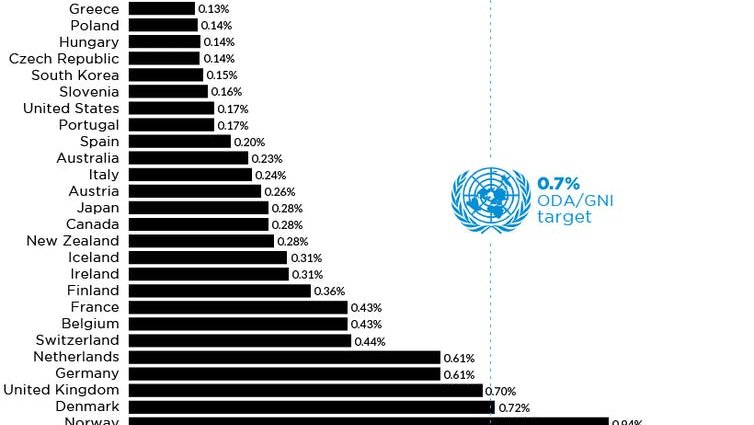As part of his spending review, chancellor Rishi Sunak has announced a cut to the UK’s foreign aid budget, which will be reduced from 2021 from 0.7% of gross national income to 0.5%.
The saving of approximately £4 billion will surely be welcome in some quarters. The impact of dealing with COVID-19 has caused the British economy to contract and Britain is facing an economic crisis which is likely to dwarf the impact of the 2008/9 banking crisis.
Despite the Conservative party manifesto promising to maintain aid spending at the 0.7% level, there has been huge pressure on the spending promise. It is not a popular policy, particular among Conservative voters, and the merging of the Department for International Development (DfID) with the Foreign and Commonwealth Office (FCO) had made a reduction likely even before the impact of COVID was entirely apparent.
However, critics of the cut argue that it is shortsighted and that the UK’s overseas development aid (ODA) budget is money which is very well spent. In fact, foreign office minister Baroness Sugg has announced she intends to resign in protest at the move. So what benefits does Britain’s ODA budget provide – not simply for developing nations, but for Britain as the donor nation, and how might this cut impact on those?
The 0.7% spending target for overseas development aid was established by the United Nations in the Pearson Commission report, published in 1969. For critics of that spending target, the 0.7% figure is outdated and arbitrary and only a very small number of nations actually achieve it year on year. The largest aid donor in the world, the United States, donates approximately 0.2%-0.3% of its gross national income each year, but the size of its economy dwarfs all other donors.
For the UK, this commitment was made by Tony Blair’s government and was then enshrined in law in 2015, with a Liberal Democrat private member’s bill being given parliamentary time by the coalition government. For the Blair government, and those that followed it – up to and including Theresa May’s administration – the foreign aid budget was a way of buying influence and friends.
By investing in developing nations, the UK could help to develop emerging markets, and that investment allowed them to reap the financial rewards of close trading links with developing nations. In addition to developing and accessing new markets, the ODA spend allowed Britain to encourage developing nations to engage with the international community in ways the UK thought was beneficial, whether that was encouraging free trade or democratic practices.
Money talks a language universally understood. Supporters of Britain’s ODA budget have suggested that it has been a wise investment by UK PLC. They point to the fact that the majority of the money “invested” in developing nations has led to subsequent gains for the UK treasury although the diffuse nature of that relationship make empirical evidence difficult to come by. The select committee which oversees ODA spending is a formidable organisation because of its cross-party structure and while corruption can occur with ODA spending, the oversight of that spending is extensive.
For their part, many of those developing nations were former British colonies – much of the UK ODA budget is spent in former British colonies and Commonwealth member states – and the aid budget allowed the British to create new, friendly relationships with nations which didn’t have the most positive view of dealings with the UK. Any discussion of colonial reparations, as happened in 2015 when David Cameron visited Jamaica, can be ignored with such an extensive ODA budget.
Additionally, as Britain struggles to maintain a position of international power (particularly post-Brexit when it is no longer part of the EU), a leading role as defender of the developing world gives the UK an influential role and a voice once again in global governance. If you wish to punch above your weight you need to have something to help you land the punch – and in the 21st century, Britain’s role as a leading foreign aid donor has been a key factor.
Visual Capitalist
The savings that Sunak is expected to make from this cut are approx £4 billion, but the impact could be immense. As many charities will tell you, the key to donation is sustainability. A one-off donation can only do so much, but repeated donations can achieve so much more.
The reduction of Britain’s gross national income because of the impact of the pandemic meant that aid spending was already expected to fall sharply in the next financial year. By cutting the ODA budget further, the government will cut off important development projects. Fewer children in developing countries will go to school, more women will die in childbirth, more people will go hungry.
The impact of that won’t simply be felt in those developing nations which ODA has done so much to help. It will be felt in the UK when those new markets contract, when the deals with developing nations reduce in frequency, when the Treasury receives less in taxation payments.
If Rishi Sunak needs to cut spending – and everyone agrees that money needs to be saved – there are many other places he could sensibly begin. Cutting the ODA budget is shortsighted and potentially damaging – not just to the UK’s collective conscience but our bank balance.
Read more:
Spending Review 2020: the experts react
![]()
Victoria Honeyman does not work for, consult, own shares in or receive funding from any company or organisation that would benefit from this article, and has disclosed no relevant affiliations beyond their academic appointment.











